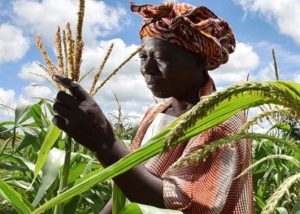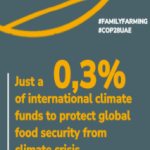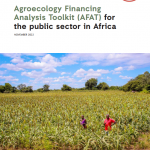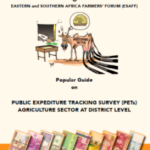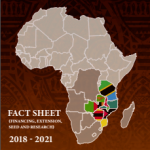How Small-Scale Farmers Are Fighting Hidden Hunger
Over the years, hidden hunger has been limiting the growth and development of children; affecting the health and working capacity of different individuals hence becoming a great contributor to the never-ending poverty built over generations.
The World Health Organization (WHO) defines hidden hunger as the lack of vitamins and minerals which occurs when the quality of food people eat does not meet their nutrient requirements, the diet is deficient in micronutrients such as the vitamins and minerals that they need for their growth and development.
As results Malnutrition is one of the outcomes of hidden hunger as it is caused by deficiencies of vitamins and minerals hence impairing both the intellectual and physical development of children causing disease and stuntedness in rural areas and very poor urban families.
According to UNICEF, over 2.4 million children in Uganda are stunted due to lack of iron, zinc and vitamin A in their diet, an irreversible condition.
In contrast, half of the children under five and one-quarter of child-bearing-age women are anaemic. It is estimated that about 13 million people in Uganda, including pregnant women and young children, are faced with hidden hunger with the need for vitamins and minerals.
Hidden hunger has been exposed by COVID-19 since it has and continues to disrupt the food systems hence reducing the availability of nutritious foods mostly for poor and vulnerable households.
The Food and Agriculture Organisation (FAO) notes that the COVID-19 pandemic presents both immediate and long-term nutrition challenges. Government of Uganda implemented some actions to curb the pandemic, including restriction of movements of individuals and lockdowns hence crippling sources of livelihoods and putting several people out of work.
During the COVID-19 pandemic period, most households in urban areas are focusing on finding anything to eat to avert starvation. Government of Uganda moved fast and started distribution food mostly posho and beans to over 1.5 million households in urban areas like Kampala and Wakiso district; Other local governments in the country also distributed some foodstuffs to their populations in the town centres.
This further exposed them to the risk of hidden hunger as most nutritious foods such as meat, fish, fruits and vegetables are expensive or inaccessible hence cutting them out in favour of cereals and grain, which offer fewer nutrients, but are far more affordable.
The World Health Organisation (WHO) has a target of reducing malnutrition by 2025. It is estimated that about 2 billion people, especially women and children, suffer from vitamin and mineral deficiencies. Household poverty is one of the highest contributors to hidden hunger as most households can’t afford to buy foods that give enough vitamin a, iodine and iron, and sometimes other essential nutrients.
In Uganda, hidden hunger problem is also exacerbated by lifestyles and lack of knowledge on what constitutes a proper diet. In response to COVID-19, governments have taken swift, drastic, context-specific actions to protect public health.
The Ministry of Health (MoH) in Uganda is encouraging the consumption of a balanced diet with a view that it would support the population to build immunity which is very important in the fight the coronavirus in the body.
Small-scale farmers understand that the effects of hidden hunger like mental impairment, lower immunity, brain damage and physical disabilities, among others, in children isn’t what they desire for the population, especially their children.
To this end, small-scale farmers under Eastern and Southern Africa Smaller Farmers Forum (ESAFF-Uganda Chapter )are taking some actions contributing to fighting hidden hunger during the COVID-19 pandemic. They are setting up farmer field school to multiply some local plants which have been neglected and underutilized yet very nutritious and locally found in their communities.
Some of the seeds of such nutritious plants are also kept in various community seed banks set up by small-scale farmers to preserve them for future use by the next generation. Small-scale farmers are also setting up what is commonly known as kitchen gardens of plants like cabbages, tomatoes, onions, greens which aren’t generally planted for in their main gardens yet are sources of vitamins, minerals and essential nutrients and which help to prevent malnutrition.
Last year, small-scale farmers introduced Agroecology Clubs in different schools. These Clubs have set up school gardens of nutritious organic crops. Some Agroecology Clubs have a bigger plan of venturing into local animal rearing. All this is to boost the quality of food that is eaten at school and in their communities.
During the World Environment Day this year, small-scale farmers launched a campaign to plant 50,000 trees including long-lasting fruit trees, so far small-scale farmers have planted mangoes, traditional oranges among others.
During this COVID-19 period, small-scale farmers are also sharing nutritious foods which other community members who don’t have enough food, this is because farmers acknowledge that hidden hunger is not an individual challenge but rather a community challenge. These simple actions by small-scale farmers are leading to significant changes in the health of community members. As well as mindset shift that communities can come together to fight hidden hunger.
Small-scale farmers are further conducting community research and profiling more small-scale farmers to build evidence that the approaches are working at the time when society seems stressed with COVID-19. Findings from such research are useful for engagement of the Government of Uganda on policies and practices that need to be adopted or nationally promoted to protect the nutritional security of the population.
According to the Uganda Food and Nutrition Policy, the government is committed to the excellent health and nutrition of its entire population with a further commitment to address issues of food security and nutrition and to promote development.
Small-scale farmers believe that the government should justify their commitment through increasing public financing to the agriculture sector and prioritizing some nutritious neglected and underutilized species which could address the current situation of hidden hunger.
Small-scale farmers also believe that the media has a significant role to play in changing mindset of the population on some lifestyles that promote unhealthy feeding during this period. Small-scale farmers further believe that policies in Uganda should prevent a rise in all forms of malnutrition as a result of the pandemic and protect the food system in Uganda.
Governments must develop measures towards the improvement of food security through cross-sector approaches. This is an excellent approach to consider for combating the malnutrition crisis as well.
Writer: Andrew Adem – Program Manager (ESAFF Uganda)

















